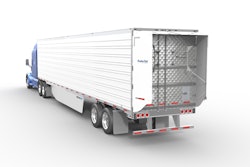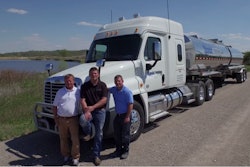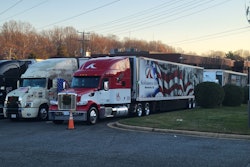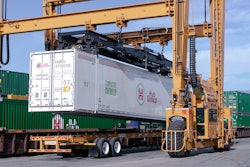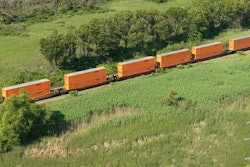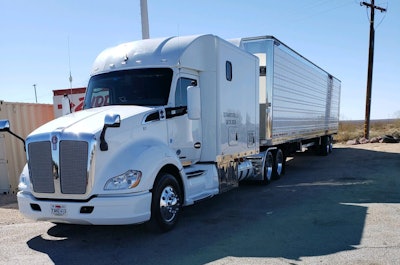
They’ve come wearing masks and gloves. Some have brought their kids to teach them a homeschool lesson on the road.
Allen Farms in Norman, Oklahoma, has become a lot more popular during the pandemic where retail sales of sod have been soaring.
“Before the weather even broke a little bit, the phone was ringing off the hook,” said Allen Farms owner Kevin Andrews, who also owns an auto hauling business that has had roughly half of its revenue wither during shelter-in-place directives brought on by COVID-19.
Andrews’ trucks will deliver sod when folks order 10 pallets or more. Social distancing applies at the store where folks have to call in orders and pay over the phone with a credit card. Deliveries can get interesting, too.
 Better days | Kevin Andrews with his daughter Emma picking up a truck he bought in Kansas about a year ago.
Better days | Kevin Andrews with his daughter Emma picking up a truck he bought in Kansas about a year ago.“I made a delivery last week. We went to a lady’s house and she wasn’t even there,” Andrews said. “She just told me what to do over the phone and I delivered her grass. Never saw her. Left her a copy of her receipt under the sod and left.”
Commercial sales have also been underway at Allen Farms, but it’s the record retail sales that really stand out. Plenty of grass spread out over 90 acres isn’t quite looking its best, Andrews said, yet it’s still a sight for sore eyes for those itching to get out and go to work.
“People bring their kids out there because we’ve got some wide-open space,” Andrews said. “We’re seeing people with masks and gloves on that are completely stir crazy. They’re not staying home. They’re just going somewhere that’s open and they want something to do.”
Andrews said he even overheard one woman teaching her children about the sod farm – a homeschool lesson that has to remain outside since the store’s locked up.
For Andrews’ car hauling business, Dave Meeker Auto, business has been the polar opposite.
“What we’re finding is that we’re running about 50%,” Andrews said. “Last Monday morning we billed out about maybe 60 to 65% of our norm. This week we billed out about 45%.”
Car dealerships aren’t selling as much, which has idled trucks. Based out of Purcell, Oklahoma, Dave Meeker Auto has a dispatcher in Branson, Missouri, and a brokerage office in Pensacola, Florida.
“We’re pretty diverse because drivers live all over,” Andrews explained.
Most of Andrews’ drivers are owner-operators based in Branson, where the business originated. Normally, 20 to 25 trucks would be hauling for Andrews. Some are waiting out the pandemic at home while others are still hitting the road where Andrews said the used auto market has enjoyed more business over new sales.
“We haul primarily used cars. We don’t haul a lot of new. We do some. And so as a used car hauler, we’re not hit as hard as the new car carriers are. But with that said, we’re still limited to different types of things,” Andrews explained. “For example, we’re still hauling into the new car dealerships. They’re used cars. So, they’re limited on sales and things like that. We’re also limited to a lot of our auctions that we haul out of because they’ve either shortened hours or are closed on the weekends.”
To help make ends meet, Andrews turned to the U.S. Small Business Administration’s Paycheck Protection Program for help and was approved for a loan.
“It’s going to basically buy me two months of supplemental income for downtime, and if it will do the same for everybody else, then we’ll all be OK,” he said.
Blues running deeper than the Depression
Chris Olson, owner of SOS Transportation in Carlton, Oregon, has been hauling for special events like concerts, plays and trade shows since the 1970s. Now, for the first time, he’s seen all of his trucks and those of his competitors come to an abrupt stop.
“It’s weird parking all the trucks. They’re just parked,” Olson said.
And unlike during the Great Depression in the 1930s when people flocked to the movies to escape their woes for pennies a show, movies theaters have rolled up their red carpets, as have concerts, plays, trade shows and other special events. Suddenly, a niche market for carriers to operate in went completely dead with nationwide shelter-in-place directives.
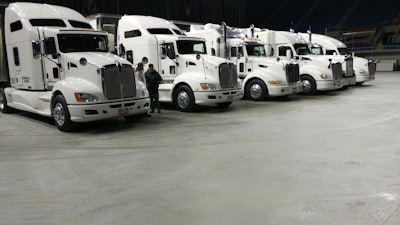 SOS Transportation at the Fargodome in North Dakota. Olson has hauled for some of the biggest names in the music industry and hopes to again soon.
SOS Transportation at the Fargodome in North Dakota. Olson has hauled for some of the biggest names in the music industry and hopes to again soon.Olson’s dry vans, like others in his line of work, are specialized. Still, he considered hauling freight to help pick up the slack – that is until the guy on the phone offered him a paltry rate of a dollar a mile to haul from California to Iowa and New York.
“My guys are on salary. I’ve got to pay them every day they work. So between their per diem and their salary, they’re making $230 per day,” Olson said. “Plus there’s fuel. We have very high insurance. $10 million in liability. $2 million in cargo. And the trailers are pretty specialized. We’re just not designed to haul freight and it doesn’t pay well enough to even make cash flow.”
For the first time since hitting the road as a truck driver in the early 70s, Olson said he turned to the government for help. Like Andrews, Olson’s company was also approved for an SBA loan. However, he’s not comfortable with massive, nationwide government assistance.
“I don’t think we should mortgage the country and our children’s future when you can put everybody to work. Test them everyday and if they get sick, send them home,” Olson said. “Old people like me, if I worry about it, then I should stay home. But to turn the country off, bothers me.”
As it turns out, Andrews and Olson applied for and received their business loans just before they dried up. The SBA said Thursday it was “unable to accept new applications for the Paycheck Protection Program based on available appropriations funding.” The first-come, first-serve $349 billion program ran out of cash in less than two weeks.
Olson, who favors Kenworth trucks, hopes to put his ten rigs back to work in July for a major concert. So far, the event hasn’t been cancelled.
“We’ll see. I’m old. I would go to work if I get the chance,” Olson said. “If I get the stuff and it kills me, then it kills me. We need to start the country back up.”





